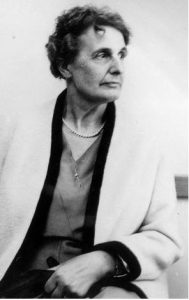A Protestant doctor helping the Jews
Marthe Adelaide Haas was born on the 1st January 1906 in Hohwald (Bas-Rhin), the last of Pastor Haas’s seven children. In 1910 the family moved to Gebwiller. She studied medicine in Strasbourg and submitted her thesis in 1933. In Alsace she started a home for disadvantaged children and then went to Switzerland to work as a neuro-psychiatrist until 1939. Like part of the Alsatian population, she was then evacuated to the Dordogne area, and afterwards to Lanemezan (Hautes-Pyrénées). When she heard that her mother was ill, she applied for a pass which was refused. She ignored this, and was arrested at the border, and taken to Bourges Railway station to have her identity checked. On the platform she stood up for (in German) a Jewish family being badly treated by the Germans. She was imprisoned in Bourges, was a witness to the first mass arrests, and, as a “friend of the Jews” was sentenced to share in their fate. She was detained at the camp in Pithiviers and then confined with Jews at Beaune-la-Rolande. She carried out medical duties and witnessed the departure of Jews for an unknown destination. In November 1942 she was transferred to a succession of camps and, in January 1943 deported to Auschwitz-Birkenau with 230 French women, mostly political prisoners.
She was assigned to a “Revier” (infirmary) where she offered medical care to her comrades and saved some by declaring them fit for work. She was transferred to block 10 where she was forced to attend “medical experiments” done by German doctors on Jewish women, such as sterilisation and uterine cancer detection. She objected, and was immediately transferred to Birkenau where she had the opportunity to treat people suffering from typhoid fever and so doomed to the gas chamber. She was to learn later that the SS had been ordered to take her to block 10 to be executed.
In April 1945 she was liberated by the Soviets, but stayed in the camp to treat the sick. She returned to France in June, on the last flight transporting deportees. She became a school doctor again and was awarded the Légion d’Honneur (Legion of Honour) in 1945. She wrote her memoires entitled Médecine et crimes contre l’humanité (Medicine and crimes against humanity) and had the opportunity to testify against Dering – the Nazi physician responsible for experimenting on at least 400 Jewish women. In May 1965 she was awarded the « Righteous among the Nations » medal. In 1988, at 82, she chose to take her own life.



